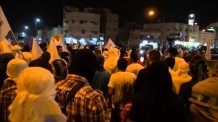In a special documentary report, BBC was able to meet activists of the political movements in the Eastern Region of Saudi Arabia which took place three years ago.
People in Qatif are frequently come out to protest against what they call "years of oppression”, demanding a more equitable distribution of oil. In some cases, the clashes between protesters and security force became violent which led to the killing and wounding many activists.
Safa Al-Ahmed, a journalist from BBC talked in the documentary about the Saudi regime which refuses reforms and the establishment of any independent political or rights activity. She speaks to activists; many of whom are on the government's most wanted list.
BBC had got exclusively rare footage of protesters in Qatif, which is considered the center of the movement and the location of the largest field of oil in the world.
Al-Ahmed said that "this uprising is unprecedented in the history of Saudi Arabia and it is difficult for foreign journalists to access Qatif or even Saudi Arabia, so these protests are rarely covered by media”.
Recently, after the death of two security officers, Saudi government declared that people who come out in demonstrations are considered terrorists.
In a response to the documentary film which was presented by BBC on May 30, Sabq, a Saudi electronic Newspaper published an article criticizes Al-Ahmad.
The Newspaper said that “Al-Ahmad presented oppositions as activists demanding their right to make people believe that Saudi Arabia oppress Shiite sect”.
Sabq added that “Al-Ahmad had visited cemetery of the Shiites alleging that they were killed by security forces but had not met the families of security officers who were died or injured in the confrontation with those terrorist groups”.
In the same regard Nas, an electronic Newspaper published an article on May 30 titled “Safa Al-Ahmad Documentary Fuels Terrorism and Sectarianism”.
Nas said that “Al-Ahmad’s documentary raised anger inside the Kingdom and in contrast to documentaries which provide objective point of view, “Saudi’s Secret Uprising” presented the view from a unilateral side which is the opposition only”.
On the other hand, Salman Al-Dosari published on June 1, an article in Al-eqtisadiah Newspaper titled “BBC and Furor of Awwamiyya” in which he criticized the channel saying that “BBC by presenting “Saudis’ Secret Upraising” lost Credibility and objectivity of its programs”.
Al-Dosari denounced describing opposition as activists saying that “people who demand the fall of the Saudi regime and firing security officers are terrorists”. He added that “through the promotion of false information, Al-Ahmad seeks to make people believe that Saudi Arabia oppress Shiite”.
He concluded that the documentary is considered as a proof justifies the reaction of authority toward Awwamiyya events by the terrorists themselves.
The documentary also raised controversy in Saudi social networks sites which confirmed that it is considered a sectarian one; especially that the presenter is a Shiite Journalist.
Most Saudis believe that the report incite extremism, terrorism and sectarian strife among citizens.
Other members in Twitter praised Al-Ahmad’s investigation, particularly because she risked with her life to access difficult area for journalist to operate and met activists who have not been interviewed in any media institution before.
/129

